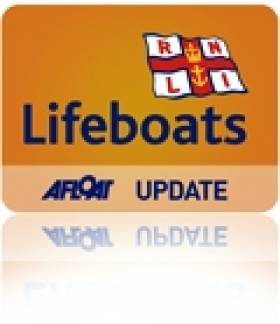Displaying items by tag: donations
Youghal Lifeboat Station Receives Two Generous Donations To Help Save Lives At Sea
#Lifeboats - Youghal RNLI were honoured to receive two generous donations from members of the community in one day recently.
On Saturday 16 February, the East Cork lifeboat station welcomed sisters Aisling and Leanne Hehir who recently celebrated their birthdays, with Aisling turning 18 and Leanne 21.
Instead of gifts, they asked their family and friends to make a donation to Youghal RNLI. In total they raised €590.
Patsy O’Mahoney, helm at Youghal RNLI, said: “We are all very touched by such a generous and thoughtful donation, we would like to sincerely thank Aisling and Leanne and everyone who helped them to celebrate their birthdays.”
The station also received a donation of €1,358 from Youghal Rotary Club, who in conjunction with the Regal Cinema, organised a fantastic fundraising night at the movies.
Filmgoers were treated to delicious canapes, a glass of wine and a screening of award-winning documentary The Camino Voyage.
Derry Walsh, Youghal RNLI’s lifeboat operation manager, said: “We would like to express our deep gratitude to Youghal Rotary Club, the Regal Cinema and to all who came along on the night.
“This donation will enable our volunteers to continue saving lives at sea.”
RNLI Appeals for Donations to Ensure Its Survival
The Royal National Lifeboat Institution (RNLI) has issued an appeal for funds to ensure its survival.
The volunteer crews from the RNLI go to sea hundreds of times a year to help those in danger off the Irish coast, often in terrible conditions.
One recent rescue reported on Afloat.ie saw the Fenit inshore lifeboat launched to go to the aid of a fishing vessel in Tralee Bay having difficulties in thick fog.
The lifeboat successfully found the disorientated oyster fishing boat, with three crew members aboard, then discovers two further oyster fishing boats also struggling in the fog. All three were escorted safely back into the harbour.
The last two years were the busiest in the RNLI's history, the organiation says, but income is in danger of not keeping pace.
Last year volunteer-crewed lifeboats rescued 813 people from the seas around the Irish coastline, They are ready to go to sea whatever the conditions, and are on call 24 hours a day. But they can't do this without your help.
The RNLI is a charity and relies on donations to keep the lifeboat service running. If you can give anything, please forward it to the RNLI Fundraising Appeal, RNLI Ireland, Dept AA1280, PO Box 4214, Freepost, Dublin 2.

























































